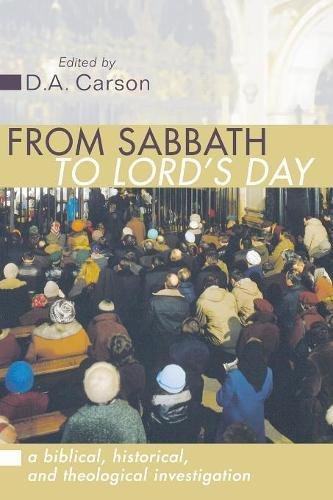A Brief Book Summary from Books At a Glance
By Benjamin Montoya
About the Author-Editor
D. A. Carson, one of the authors and editor of this book, is research professor of New Testament at Trinity Evangelical Divinity School, Deerfield, Illinois. He has written or edited more than fifty other books, including The Gagging of God: Christianity Confronts Pluralism, Becoming Conversant with the Emerging Church, and The Intolerance of Tolerance.
Introduction
In this book Carson and the other authors provide a biblical, historical, and theological investigation of the Sabbath, the Lord’s Day, and how the people of God in the New Testament decided to worship on the Lord’s Day instead of the Sabbath. Carson begins this book by explaining the context of this discussion. The other authors continue by considering this topic from the OT, NT, the history following the NT, and the practice of keeping the Lord’s Day throughout Church History. In essence, this book provides an explanation of why Christians chose the Lord’s Day instead of the Sabbath to worship. The book began as a research project sponsored by the Tyndale Fellowship for Biblical Research in Cambridge to consider “Sunday” more fully.
Table of Contents
Preface
Chapter 1 Introduction by D. A. Carson
Chapter 2 The Sabbath in the Old Testament by Harold H. P. Dressler
Chapter 3 A Summary of Sabbath Observance in Judaism at the Beginning of the Christian Era by C. Rowland
Chapter 4 Jesus and the Sabbath in the Four Gospels by D. A. Carson
Chapter 5 The Sabbath, Sunday, and the Law in Luke/Acts by M. Max B. Turner
Chapter 6 The Sabbath/Sunday Question and the Law in the Pauline Corpus by
D. R. de Lacey
Chapter 7 Sabbath, Rest, and Eschatology in the New Testament by A. T. Lincoln
Chapter 8 The Lord’s Day by R. J. Bauckham
Chapter 9 Sabbath and Sunday in the Post-Apostolic Church by R. J. Bauckham
Chapter 10 Sabbath and Sunday in the Medieval Church in the West by R. J. Bauckham
Chapter 11 Sabbath and Sunday in the Protestant Tradition by R. J. Bauckham
Chapter 12 From Sabbath to Lord’s Day: A Biblical and Theological Perspective by
A. T. Lincoln
Chapter 1- Introduction
D. A. Carson
Research and publications on the Sabbath and the Lord’s Day abounds; a simple glance at the footnotes and bibliography of this book will reveal that. This book arose because the authors concluded that the research was lacking given some of its conclusions about the following matters. First, the argument that the NT unambiguously develops a “transfer theology” (16), which the Sabbath moves from the seventh day to the first day of the week, is unpersuasive. Second, the argument that Sabbath keeping is presented in the OT as the norm from the time of creation onward remains unconvincing. Third, the claim that the NT develops patterns of continuity and discontinuity on the basis of moral/civil/ceremonial distinctions remains problematic. Fourth, the assertion that Sunday observance arose only in the 2nd century A. D. is unconvincing. Fifth, the case that builds upon historical reconstructions of the patristic period that are read from isolation and ambiguous expressions that are used to develop massive theological schemes provides a faulty line of reasoning. The goal of this book, then, will be to avoid these errors; to do so, the authors plan to look more carefully at the original sources throughout each chapter to provide an overall synthesis of their research by the end of the book. This area continues to receive a lot of research because it touches on so many aspects of biblical, theological, and historical scholarship.
Chapter 2- The Sabbath in the Old Testament
Harold H. P. Dressler
The best place to start when considering the Sabbath is the Bible, and perhaps the best place to start within the Bible is the OT because it is there that we have the most teaching. But, some scholars have claimed that the matter of the Sabbath has origins elsewhere. First, a Babylonian origin has been proposed, such that the Hebrews found the seven-day week in Canaan and appropriated it into their teaching. Second, a lunar origin has been argued; that is, that the Babylonian Sabbath day is the day of the full moon. Third, a Kenite origin has been suggested. In this line of thinking, the Sabbath was an ancient taboo day for the Kenites, the forgers (smiths) of the desert, a people that Moses came into contact with. Fourth, others have. . .
[To continue reading this summary, please see below....]The remainder of this article is premium content. Become a member to continue reading.
Already have an account? Sign In
Buy the books

FROM SABBATH TO THE LORD'S DAY: A BIBLICAL, HISTORICAL, AND THEOLOGICAL INVESTIGATION, edited by D. A. Carson